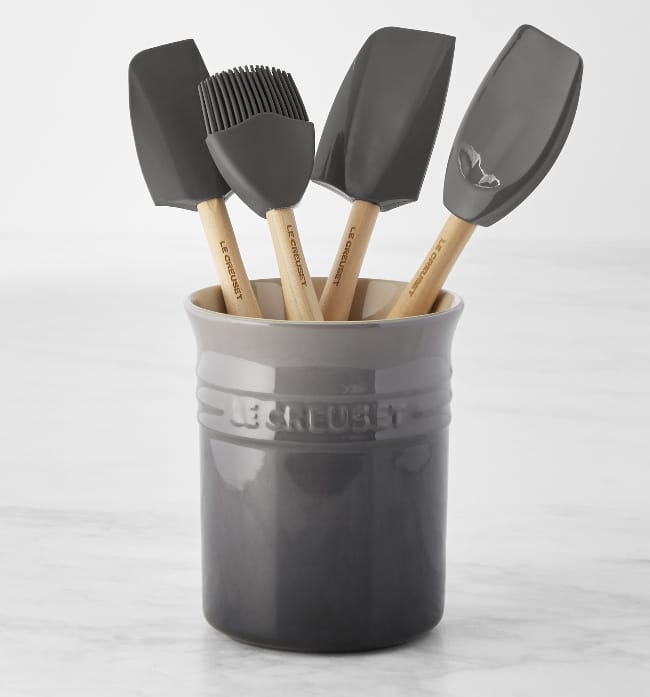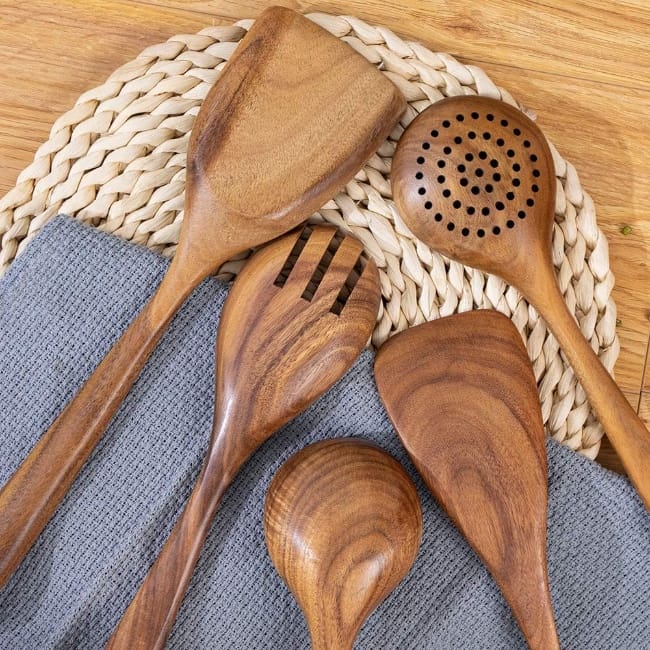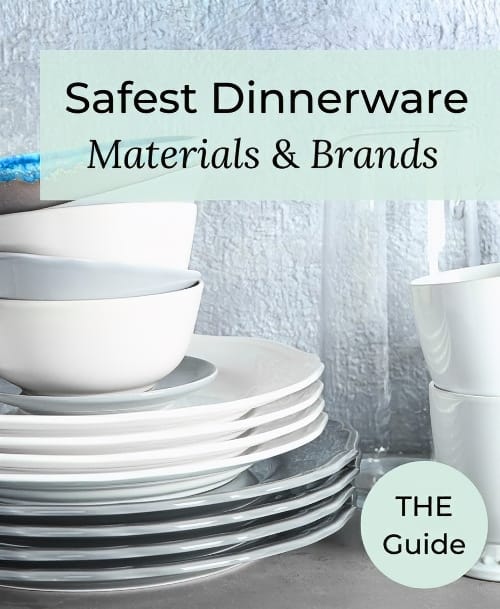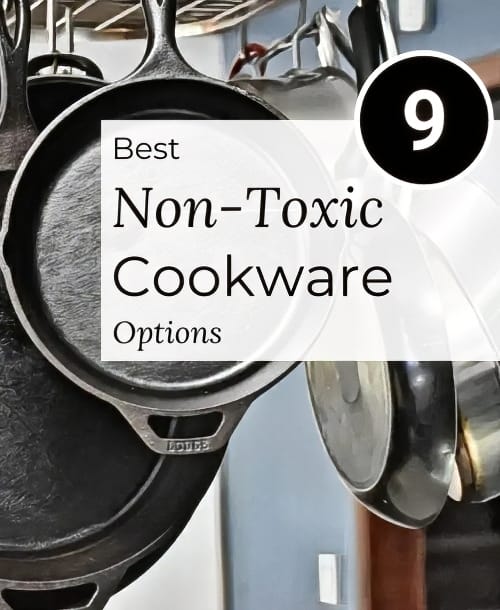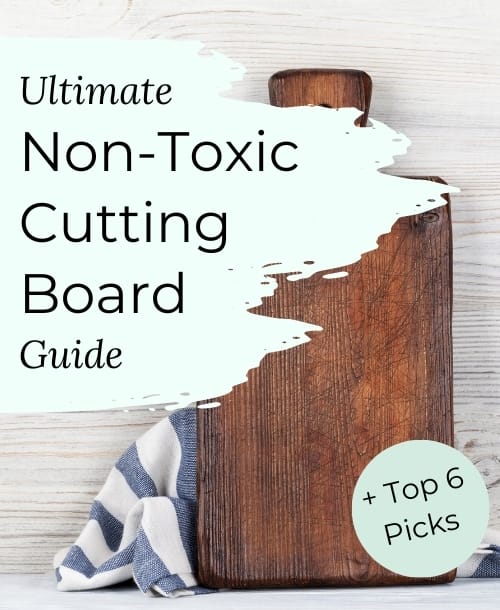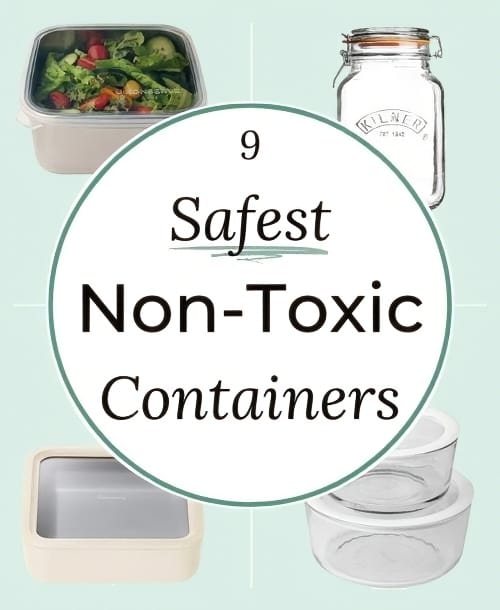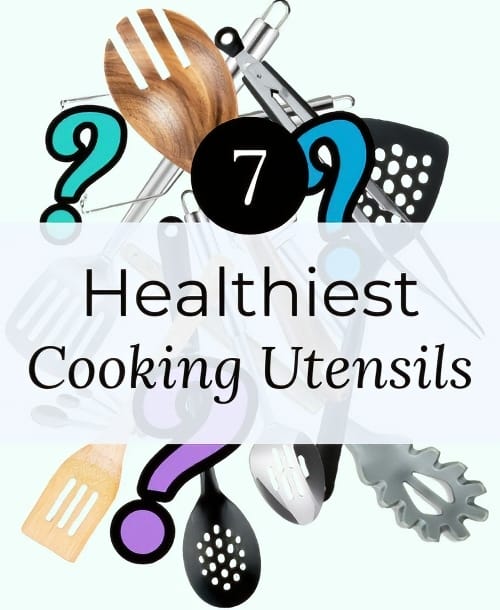
Equipping your kitchen goes beyond looks and how many things a spatula can do. It’s also about keeping yourself safe!
This guide dives into the healthiest cooking utensils, the ones that won’t mess with your health:
We’ll discuss the murky waters of less-than-great kitchen tools. From plastics laden with bisphenols and phthalates to melamine and nylon utensils’ deceptive safety — it’s all covered below.
We’ll also explore healthy alternatives in stainless steel, bamboo, silicone, and wood. These are all durable, heat-resistant, and eco-friendly, so you can cook up a storm without toxins.
We even gathered some top picks for each material so you can immediately make a swap.
Ready? Let’s get started!
Medically-reviewed by Dr. Ahmad Alsayes, MBBS
Understanding Toxic Risks in Kitchen Utensils
Before we arrive at the safest cooking utensils, here are the toxic tools to steer clear of:
Bisphenols in Plastic Utensils (BPA, BPS, BPF)
Bisphenol A (BPA) is a chemical used in producing various items like food containers, reusable bottles, and, potentially, some cooking utensils. It can leach into food, especially when exposed to high heat or acidic foods.
BPA is an endocrine disruptor, and ingestion is linked to health issues like hyperactivity/ ADHD and heart/ cardiometabolic diseases. I don’t recommend plastic cooking utensils for this reason.
Even BPA-free options may contain similar hormone-disrupting chemicals, such as BPS or BPF, which link to obesity, asthma, and other more serious concerns. Plus, the widely-used BPA-free plastic Polypropylene melts as low as 320°F. Pan temperatures can quickly exceed 320°F, making plastic utensils a poor choice.
Phthalates in Plastic Utensils
Phthalates, hidden in some plastics (look for DEHP, DBP, PVC #3), are used to increase flexibility. They can seep into food, especially when heated.
Phthalates are linked to several health risks, including hormonal imbalances, reproductive issues, and developmental problems in children. This is another reason to steer clear of plastic utensils.
PFAS in Kitchen Utensils (Teflon/ “Non-Stick”)
PFAS coatings, such as PTFE (Teflon), are mainly used in non-stick cookware, not cooking utensils themselves. Whenever you see “non-stick cooking utensils,” this term often just means the utensils won’t scratch non-stick pans.
Still, double-check there is no PFAS coating on the utensils.
These chemicals can leach into food and even off-gas potentially harmful fumes above 482°F. They accumulate in our bodies (and the environment), causing pollution and possible health issues.
Melamine Utensils
Melamine utensils are great for serving food and snacks – but not for cooking.
High heat (especially with acidic ingredients) can cause melamine to leach into food. Long-term exposure to this chemical has been linked to kidney problems and other health issues.
Nylon Utensils
Nylon utensils seem like a good option—they’re strong and can handle heat. But here’s the catch: nylon melts at around 400°F (204°C).
While that’s higher than some plastics, it’s not invincible. Overheat a pan, and your nylon spatula might start to melt, leaving microplastics in your food. Nylon microplastics harm marine life, as well. Not cool.
Plus, nylon comes from oil, which isn’t the most eco-friendly choice.
Safest Materials for Cooking Utensils | Pros & Cons
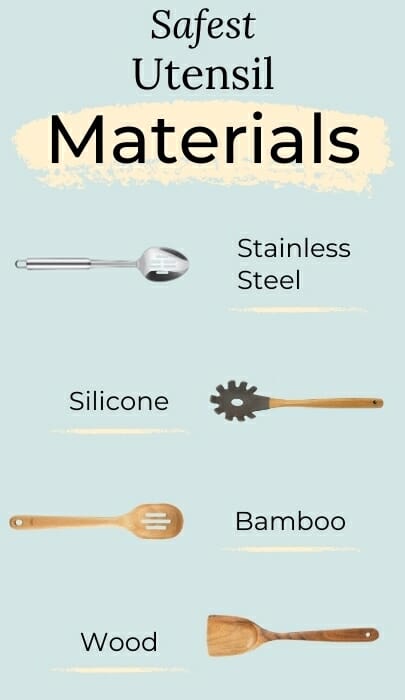
When selecting the healthiest cooking utensils, the following material criteria are vital to ensuring safety and sustainability:
- Safety first: Ensure your utensils don’t leak chemicals into your food, even when it’s hot. Skip plastics and choose utensils free of BPA, phthalates, lead, cadmium, and melamine.
- Heat Resistance: Your utensils shouldn’t melt when things get hot on the stove. They need to be tough enough to handle the heat.
- Durability: Invest in utensils that won’t break easily and will last a long time. Less waste is always a good thing!
- Eco-friendliness: Choose materials that are renewable, biodegradable (i.e., bamboo, wood), or recyclable (i.e., steel, silicone).
Stainless steel, bamboo, silicone, and wood are the superhero squad of cooking utensils. They’re safe, functional, and kind to the environment.
Let’s dive into the details of each material:
Stainless Steel Utensils
Pros:
- Safety: No chemicals leak into your food, no matter how hot things get.
- Heat Tolerance: They can handle the heat – no melting or warping, even on high flames.
- Built to Last: These utensils are robust and won’t bend, break, or wear out easily. They’ll be around for a long time!
- Sustainability: Stainless steel is 100% recyclable, lowering its environmental footprint and promoting a circular economy.
- Easy Cleanup: Toss them in the dishwasher – no scrubbing required!
Cons:
- Non-Stick Scratchers: They can scratch non-stick pans, so be careful when using them.
- Getting Hot: They can get hot to the touch, so use oven mitts!
- Loses Its Shine: They might get water spots or lose their shine over time. But a quick polish makes them sparkle again.
Stainless steel utensils are the workhorses of the kitchen. The best types are corrosion-resistant 304-grade (18/8) and 316-grade (18/10). Just be careful with non-stick pans.
Silicone Utensils
Pros:
- Safe for Cooking: Made from a combo of silicon (like sand!) and oxygen, food-grade silicone is generally safe. It’s inert, so no weird chemicals leach into your food.
- Heat Tolerance: They can handle serious heat without melting – up to 446°F, making them versatile for cooking and baking.
- Non-Stick Savior: Soft and flexible, they won’t scratch your non-stick pans, making them last longer.
- Easy Cleanup: Dishwasher-safe and naturally stick-resistant for easy handwashing.
- Color Variety: Available in various colors to match any kitchen decor.
Cons:
- Recycling Challenges: Silicone is not biodegradable, and few places recycle it, posing environmental disposal issues. However, its durability can mean fewer replacements over time.
- Structural Integrity: Silicone utensils can bend under pressure, making them less ideal than wood or steel for tough jobs.
- Heat Conductivity: Silicone can hold some heat, so be careful if you leave it in hot pots. However, it typically stays cooler than metal utensils.
Silicone cooking utensils offer a safe, heat-resistant, and cookware-friendly option for the kitchen. Ensure you get “food-grade” silicone that’s certified by the FDA.
Bamboo Utensils
Pros:
- Safe and Natural: Bamboo is natural and doesn’t leak chemicals into your food.
- Kind to the Planet: It grows super fast, making it more sustainable than other materials.
- Heat Resistant, Cool Handles: They can take the heat but stay cool and comfy to hold, unlike metal utensils.
- Non-Stick Pan Best Friend: They won’t scratch your non-stick cookware, keeping your pans looking good.
- Easy to Clean (Almost): Just wash them by hand – no dishwasher!
Cons:
- Can Crack Over Time: If you don’t take care of them, they might crack or splinter. Avoid the dishwasher – high heat and moisture can swell and crack the utensil.
- Soak No More: Don’t soak them in water; they might swell, crack, and even grow mold.
- More Maintenance: You’ll need to oil them sometimes to keep the bamboo from drying out.
Bamboo cooking utensils offer a highly eco-friendly, safe, and non-scratch option for the kitchen. Just remember, proper care and maintenance are key to maximizing their lifespan and performance.
Wood Utensils
Pros:
- Safe Eats: Wood is natural and won’t leak chemicals into your food. It’s also naturally antibacterial.
- Heat Resistant Comfort: They don’t get hot, so you won’t burn your hands while cooking.
- Sustainability: Wood, especially from sustainably managed forests, is an eco-friendly resource compared to plastic or metal.
- Non-Stick Safe: They won’t scratch your non-stick pans.
- Looks Great: They add a warm and charming touch to your kitchen.
Cons:
- Needs Attention: Wood can crack or splinter if left in water or not cared for correctly (such as regular oiling).
- Soaks Up Stains: Wood can absorb stains and odors from food, which can be tough to remove with soap and water. But a mixture of baking soda and water can help.
- Sustainability Variable: Wood’s eco-friendliness depends on its source. Pick utensils from sustainable forests, not rare or endangered trees. Check for FSC-certified labels.
- Maintenance: Wood demands handwashing and thorough drying to prevent cracking and warping. They also may need occasional sanding to remove rough spots.
Wooden cooking utensils offer a safe, heat-resistant, and eco-friendly option that is kind to non-stick surfaces. While they require more maintenance, their durability and aesthetic value make them a great choice.
Healthiest Cooking Utensil Brand Picks for All Budgets
Best Overall Picks
1. All-Clad Professional
Key Specs:
- Material: 18/10 stainless steel
- Price (when published): $119.95
- What’s included: Ladle, solid spoon, slotted spoon, turner, fork, and storage caddy.
- Best For: Stainless steel, cast iron, and carbon steel cookware.
- Highly rugged construction that will last long. These are almost overkill.
- The set’s high-gloss stainless steel finish makes it a stylish addition to any countertop.
- After many dishwasher cycles, the utensils maintain their look and functionality.
- Good weight and comfortable grip make them easy and pleasant to use during cooking.
- Expensive.
- The extra-rugged design can be too heavy or awkward to hold for some users.
- Most of All-Clad’s products are American-made, but some aren’t (including this set).
- Sometimes All-Clad sends out incomplete sets or duplicated items. Check your set upon arrival.
All-Clad’s pro utensil set is built tough for serious cooks. It uses top-notch, rust-resistant 18/10 stainless steel, 100% plastic-free for safety. This steel resists rust better than usual 18/8 options, especially if air-dried.
Safety is a focus: the extra-thick seamless design keeps food residue from getting stuck, preventing cross-contamination.
These utensils are heavier than the cheaper options I’ve tested, so they won’t bend or dent easily. Plus, they come with a lifetime warranty for peace of mind.
Thinking eco-friendly? Stainless steel is endlessly recyclable, so you can feel good about these utensils even when it’s time to replace them (which might be a long time from now).
Just a heads-up: they can scratch non-stick pans, so use them with uncoated cookware.
Thanks to their shiny, polished finish, cleaning is a breeze! You can toss them in the dishwasher or simply wipe them clean.
Now, while All-Clad isn’t cheap, these are “buy once, cry once” utensils that will last a lifetime.
2. Le Creuset Craft Series
Key Specs:
- Material: Food-grade silicone, wood, and glazed stoneware crock
- Price (when published): $45.79 – $87.
- What’s included: Small spatula, medium spatula, spatula spoon, basting brush, and utensil crock.
- Best For: All cookware types
- Sturdy construction that offers long-lasting performance.
- A high aesthetic appeal, attractive design, and various colors that match different kitchen decors well.
- Removable silicone heads are convenient for dishwasher cleaning, while the wooden handles’ smooth finish wipes easily.
- Efficient design, with ergonomic handles and a good balance of flexibility and sturdiness in the silicone heads.
- Expensive.
- The crock provided is too small to hold additional utensils comfortably.
- The wooden handles are not dishwasher-safe and can develop mold without careful washing and drying.
- The silicone heads can retain odors; however, this is widespread with silicone. Boil the heads for 15 minutes to remove smells.
- Some customers we spoke with found their set’s handles rough to the touch, suggesting a lack of finishing/ QC.
Le Creuset’s Craft Series utensils are safe and sustainable choices for modern cooks. They combine beautiful wooden handles with removable, food-grade silicone heads, ensuring healthy cooking free of plastic, BPA, and other nasties.
Unlike plastic or nylon, silicone is super heat-resistant (over 480°F). This means no melting or weird flavors in your food. Le Creuset backs this eco-friendly choice with a 5-year warranty, highlighting the silicone’s durability and potential for recycling.
Plus, the wooden handles are biodegradable. Even if the silicone needs replacing someday, it won’t leach chemicals in landfills.
Love non-stick pans? No problem! The silicone is gentle on all cookware surfaces.
Cleaning is a breeze, too: toss the silicone heads in the dishwasher and wipe the handles clean. While the wood isn’t dishwasher-safe, it wipes clean easily.
3. GreenPan Platinum Silicone
Key Specs:
- A rugged design with quality materials makes this set suitable for frequent heavy use.
- The flexible silicone ends help curve into tight spaces (like the corners of pans), making usage more efficient. Non-scratch silicone is suitable for all types of cookware.
- 100% dishwasher-safe (no need to remove handles) for easy maintenance.
- Stylish design (available in multiple colors) to match any kitchen decor.
- Expensive for the amount of utensils you get, although they’re of high quality.
- On the heavier side for cooking utensils due to the thick silicone and steel interiors.
Greenpan’s platinum silicone utensil set might be pricey, but it’s a top-tier choice for cooks. Each utensil boasts a strong steel core to prevent bending, making them as durable as All-Clad.
Wrapped in non-scratch silicone, they’re safe for non-stick pans and flexible enough for tricky maneuvers like flipping omelets.
Plus, with this 100% plastic-free design, you’ll never have to worry about melted plastic. The safe, third-party certified silicone is a healthy alternative to plastic and nylon.
While silicone recycling can be tricky, the steel core means these last longer than nylon options. And Greenpan’s focus on sustainability helps offset these recycling challenges, using solar energy and eliminating PFAS from their production.
Unlike Le Creuset, this entire set is dishwasher-safe for easy cleaning—no need to pop the heads off.
Plus, it comes with a handy ceramic-coated crock to hold your utensils. The crock’s ceramic coating wipes clean easily and is free from PFAS chemicals.
4. From Our Place Utensil Essentials
Key Specs:
- Material: Food-grade silicone with a solid steel core.
- Price (when published): $75
- What’s included: Spatula, ladle, whisk, slotted turner, basting brush, and tongs.
- Best For: All cookware types.
- Well-made, sturdy design that’s built to last. There’s a noticeable difference in heft between this set and other silicone options.
- Trendy design and colors that match well with kitchen decor and Our Place’s cookware options.
- Perfect for use without scratching non-stick cookware, improving the longevity of pots and pans.
- Dishwasher-safe and easy to handwash.
- While the utensils match Our Place’s cookware, they do not match perfectly with their knives and shears.
- The spatula’s thick handle can make it challenging to use, depending on the size of your hand.
- The set is missing essential items such as a pasta server or regular serving spoon, limiting its utility for the price.
Our Place’s famous “Always Pan” is among my top three most used pans for a reason. This brand is a true innovator of effective, non-toxic kitchen tools.
Their Kitchen Essentials set is a winner for cooks seeking healthy cooking utensils. Like GreenPan’s set, it combines a strong steel core with safe, food-grade silicone. But Our Place goes a step further by including tongs for a more complete set.
The silicone is BPA-free, chemical-free, and heat-resistant up to 450°F (except the whisk), so you can cook safely without concern about leaching. The soft silicone won’t scratch your non-stick pans, but the steel core keeps them sturdy enough to flip pancakes easily.
Cleaning is a breeze! This entire set is dishwasher-safe, unlike options with wooden handles.
While pricier than some (don’t worry; next up is a budget-friendly alternative), it’s half the cost of GreenPan’s set.
Plus, Our Place offers a 100-day trial, free returns, and a strong warranty for peace of mind.
Best Budget-Friendly Picks
5. Home Hero Acacia/ Silicone
Key Specs:
- Material: Food-grade silicone with Acacia wood handles.
- Price (when published): $14.99
- What’s included: Solid turner, slotted turner, solid spoon, slotted spoon, ladle, pasta server, round spatula, and spatula.
- Best For: All cookware types.
- Despite its low cost, the durability of the silicone and wooden handles makes this set great for daily use.
- This set’s extensive selection of utensils covers many cooking tasks, making it a great starter or replacement set.
- The soft silicone heads are ideal for non-stick pans without risking damage.
- Despite being handwash only, these utensils are very easy to clean. Food often slides off just with water.
- Some users reported receiving sets with a gap between the wood handle and silicone heads, which led to durability issues.
- Some may find the wood handles uncomfortable, as they’re rougher than steel or silicone.
- Other users and I have found that the wooden handles fade over time. They can also become more rough to the touch. But I haven’t found this to affect function.
When I first got my apartment, one of the things that excited me most was getting my own non-toxic kitchenware. Home Hero’s silicone and wood utensils were among my first purchases. Over three years later, they’re still going strong.
These FDA-approved silicone utensils feature strong acacia wood handles. This scratch-resistant wood is naturally antibacterial and comfy, with a slight texture for a secure grip.
Unlike silicone handles, the wood here doesn’t get slippery from food oils.
The silicone might seem flimsy, but hidden steel reinforcement strengthens it for tasks like flipping pancakes. Beveled edges help slide under delicate foods like crepes. However, the utensils’ flexible ends are not ideal for scraping tough messes.
Are you a non-stick user? Good news! The soft silicone protects your pans, preventing scratches that diminish your coating’s lifespan.
While dishwasher-safe, I recommend handwashing this set. I’ve always done so, and that’s kept my set like new for 3+ years.
Lastly, this set’s value is hard to beat. As I write this, its price is an attractive $15, making it a budget-friendly winner for new cooks or those seeking non-toxic options.
6. Riveira Organic Bamboo
Key Specs:
- Material: 100% organic bamboo
- Price (when published): $14.49
- What’s included: Slotted turner, solid turner, scraper, slotted spoon, solid spoon, and salad serving fork.
- Best For: All cookware types.
- The solid, one-piece bamboo design does not chip or wear down quickly, even with regular use.
- Lightweight and comfortable to hold.
- The smooth finish makes handwashing quick and easy.
- The natural, elegant look of the utensils makes them very display-worthy.
- The spoons can discolor from very colorful or spicy foods. To prevent this, wash immediately after use before the stains can take root.
- Inconsistency in the smoothness and finish of the utensils, with some arriving rough or splintered. But luckily, their warranty is solid.
Riveira’s 6-piece bamboo utensil set offers affordability without sacrificing quality. Made from 100% organic bamboo, it’s free of chemicals and lightweight for easy handling.
Bamboo’s tight pores help it resist stains, odors, and moisture better than most woods, keeping it looking good longer. Plus, unlike plastic, it won’t melt if left on a hot pan (just avoid campfires!).
This set can perform for years as long as a utensil doesn’t break. Plus, bamboo is rapidly renewable and biodegradable, making it more eco-friendly than steel or silicone options.
The utensils are gentle on non-stick pans yet stronger than silicone for scraping messes.
Thanks to natural moisture-repellency, stuck-on food wipes right off. However, skip the dishwasher! Bamboo can still swell and crack from intense, wet heat.
This set offers unbeatable value at only $15 (at the time of writing). Plus, a limited lifetime warranty adds peace of mind.
7. Aiuhi Organic Teak
Key Specs:
- Material: 100% organic European teak wood
- Price (when published): $21.99
- What’s included: Salad fork, strainer spoon, wok spatula, spatula, and soup ladle.
- Best For: All cookware types.
- The set’s rugged construction and clean, stylish appearance make it functional and visually appealing.
- The variety of utensils covers a wide range of cooking tasks.
- Teak wood is gentle on non-stick surfaces, preventing scratches and damage to cookware.
- The utensils’ finish makes them easy to clean, and teak wood’s natural oil content means less oiling is required to maintain the finish.
- Some users reported their utensils arrived with cracks, splinters, or uneven finishes, requiring extra care.
- Certain utensils, like the spatula, can be too thick, making them less practical for specific tasks like pancake flipping.
- We found some variation in utensil wood shades, with some pieces being darker or lighter than the rest.
This list would be incomplete without wooden cooking utensils – a proven, time-tested option. As a kid, I remember my Italian grandmother using a wooden spoon to stir her homemade gravy as I awaited dinner. I may or may not have been whooped once or twice with it, too (I deserved it!).
Aiuhi’s teak cooking utensils are a standout choice for budget-conscious consumers. They’re shaped from a single piece of organic teak, free of nasties like melamine or plastic.
Teak wood evens the scoreboard with bamboo on moisture and stain resistance. Its natural oils and tight grain repel water, stains, and warping better than other hardwoods. This means no splinters, a longer lifespan, and a beautiful, high-gloss finish.
This versatile set is softer than steel and free of heat limitations. Use it for high-heat searing or delicate egg-flipping on non-stick pans without worry.
Like bamboo, handwashing is best. While teak is moisture-resistant, dishwashers are too harsh.
Frequently Asked Questions
Are plastic spatulas safe?
Plastic spatulas can be safe if made from food-grade, Bisphenol-free plastic and used within their recommended temperature limits to avoid melting. However, choose alternatives made from materials like silicone, wood, or stainless steel for maximum safety and to prevent potential chemical leaching.
Are nylon kitchen utensils safe?
Nylon kitchen utensils are considered safe for cooking at temperatures below their melting point, typically around 400°F (204°C). They are generally BPA-free and food-safe. However, using them at high temperatures or with scratched surfaces may increase the risk of chemical or microplastic leaching. Alternatives like silicone or stainless steel are preferable for high-heat cooking.
Which type of stainless steel is best for cooking utensils?
The best type of stainless steel for cooking utensils is 18/10. This grade offers a balance of durability, corrosion resistance, and safety, making it ideal for kitchen use. It contains 18% chromium and 10% nickel, enhancing its rust resistance and shine while being food-safe. However, 18/8 (304-grade) is the most common type and often cheaper than 18/10 without losing much performance.
Are bamboo cooking utensils dishwasher-safe?
Bamboo cooking utensils are not typically dishwasher-safe. The high heat and prolonged exposure to water can cause them to become brittle, warp, or crack. Hand washing with mild soap and air drying are recommended to maintain durability and appearance.
Is wood or bamboo better for cooking utensils?
Both wood and bamboo are excellent for cooking utensils, offering natural, toxin-free options. Bamboo is slightly more eco-friendly due to its rapid growth and sustainability. Wood is durable and long-lasting. Your choice may depend on environmental considerations, aesthetic preference, and the specific cooking tasks.
What kind of utensils do you use with non-stick cookware?
For non-stick cookware, use wood, silicone, or bamboo utensils that are heat-resistant and soft enough not to scratch the coating. Silicone utensils offer the most gentle touch, ensuring your non-stick surfaces’ ultimate longevity and safety.
What is the best type of wood for cooking utensils?
Closed-pored hardwoods are the best woods for cooking utensils due to their durability and bacterial resistance. Popular choices include olive wood, maple, beech, rosewood, and teak. These woods are less porous, making them more resistant to water and bacteria—ideal for kitchen use.
Recap & Conclusion
Concluding our exploration into the safest cooking utensils, it’s clear that health-conscious choices extend beyond the food we eat to the tools we use to prepare it.
Steering clear of materials like plastics with bisphenols, phthalates, melamine, and nylon, which pose risks of chemical leaching, is crucial for a toxin-free kitchen.
Instead, embracing alternatives such as stainless steel, bamboo, silicone, and wood minimizes health hazards and aligns with eco-friendly practices. These materials offer the perfect blend of safety, durability, and environmental consciousness.
Remember, the right utensils can transform cooking from a routine task into an enriching, health-forward experience.
P.S. Healthiest cooking utensils – check. But what about your cookware itself?
Check out our Non-toxic Cookware Guide to avoid the pitfalls of traditional non-stick coatings and explore healthier alternatives.

Hi there! I'm Adam, author and founder of TGL. Since 2016, I've produced and sold non-toxic kitchenware throughout the US. Today, I'm using my passion and experience in sustainable product manufacturing to help families avoid unsafe reusable foodware. When I'm not writing, you'll find me hiking or camping throughout Appalachia!
Enjoyed this post? Share it with your friends!
Related Posts


